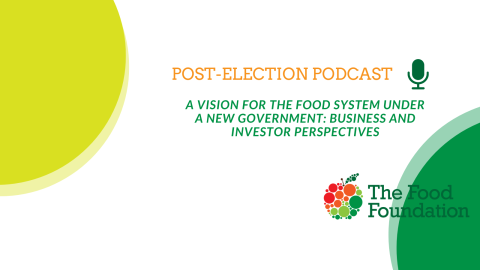06 August 2024
Assessing the new Labour government's first month in power

By Public Affairs Lead Joss MacDonald
Following the General Election on 4th July, Labour ministers have now been in office for a month. Few doubt the scale of the challenge before them due to the plethora of problems the country is facing – a stagnant economy, high levels of inequality, a continued cost of living crisis, an ageing population with a defunded health service, and a global climate emergency.
Labour made several bold promises in its election manifesto and campaign – aiming for ‘the healthiest generation of children ever’ and to ‘end mass dependency on emergency food parcels’. Combined with early commitments for the Department for Health to have a greater focus on prevention, and the Department for Environment, Food and Rural Affairs to have food security as a core plank of its remit, there is room for optimism, if these ambitions are met.
Our recent food insecurity survey* estimates that 7.2 million adults and 2.7 million children experienced food insecurity in June 2024. What’s more, households with children in the poorest fifth of the population would have to spend 70% of their disposable income on food to afford the government-recommended healthy diet.
We know there is strong support amongst the public for policies that would help tackle these high levels of food insecurity which we see in the UK.
A recent You Gov* survey commissioned by The Food Foundation showed:
- 89% of respondents supported setting the minimum/living wage at an amount that covers the cost of basic essentials including food
- 82% of respondents supported setting benefit levels at an amount that covers the cost of the basic essentials including food
- 89% of respondents supported the introduction of free school meals at lunchtime for all children in poverty
Notwithstanding the bold pledges of the Labour manifesto, the Chancellor, Rachel Reeves, has quickly made it clear that fiscal conservatism is here to stay – public spending will be limited under Labour. George Osborne himself, the architect of austerity from 2010-2016 which saw the massive rise in reliance on foodbanks, has said that he wouldn’t have done anything different to Reeves if he was in her shoes.
The Government has however already instructed the Low Pay Commission to consider the cost of living when setting the National Living Wage. This is a step towards our manifesto ask that benefits and wages should rise with the cost of a healthy and sustainable diet.
So, are Labour’s first-year plans sufficient to meet their ambitions? We examined the government’s commitments and legislative programme to identify potential impacts on the food system and any major omissions in ensuring access to a healthy and sustainable diet for all.
Opportunities in the year ahead:
Children’s Wellbeing Bill: The bill mandates primary schools in England provide free breakfast clubs. However there must be a focus on maximising the opportunity for attendance for children from low-income households. The breakfasts provided must also be as healthy (and delicious) as possible to ensure the scheme is good value for money to maximise educational attainment and public health aims. Adequate funding is also essential for the infrastructure and staff needed to deliver.
Employment Rights Bill: This bill will, amongst other things, end “fire and rehire”, strengthen protections for new mothers and make flexible working the default. Improving people’s rights at work and job security is an important part of tackling food insecurity. It is also essential for ensuring people can earn enough to afford a healthy diet, and have enough free time to buy and cook a healthy diet.
Enacting the socio-economic duty of the Equality Act, as promised in Labour’s election manifesto, should also encourage public bodies to be mindful of policies which are potentially discriminatory to those on low incomes, or from low-income backgrounds. Improvements in parental rights are also important to ensuring both parents and their children can access a nutritious diet.
Planning: The Government has a clear ambition to allow significantly more houses to be built. It is a matter of debate, but if building more houses does bring down the cost of rents and mortgages, this would have a positive and potentially significant impact on food insecurity. If people are paying less in housing costs, they will be able to spend more on better quality food.
The new National Planning Policy Framework (the primary document which sets out planning policy across the country), currently being consulted on, shows a greater focus on health including looking at ‘more consistent approaches to controlling hot food takeaways near schools'.
English Devolution: Major progress in the last few years on food policy was the introduction of universal primary free school meals in London, which was introduced by the Mayor of London and the Greater London Authority. However, it is currently not possible for other Metro Mayors or Combined Authorities to introduce similar schemes as they have notably less powers than the Mayor of London.
The proposed English Devolution Bill does not currently extend to powers over free school meal initiatives for Mayors, as exist in London, although we hope this may change. The Bill also introduce a community ‘right to buy’ for assets such as empty shops and community spaces. It would be positive if this could be used for communities to open community canteens and shops selling healthy and affordable food.
Junk Food Marketing: Labour’s manifesto stated they were ‘committed to banning advertising junk food to children along with the sale of high-caffeine energy drinks to under-16s.’ Both commitments appeared in the King’s Speech. There is also scope for the breadth of the legislation to be expanded to encompass outdoor advertising.
Healthy Start when subject to No Recourse to Public Funds: Healthy Start is the primary benefit we have that specifically targets child food insecurity. The Government has recently published a much delayed consultation on expanding the scheme to those subject to No Recourse to Public Funds. This is an important win for racial justice in the food system.
However, there is still much to do on the Healthy Start Scheme such as improving the amount offered, as well as take up, is a key way to tackle the food insecurity which is blighting the opportunities of young people. The introduction of auto-enrolment for Healthy Start would be a quick easy win for this government.
What is missing from the Government’s agenda: Before the election, The Food Foundation published our manifesto, Nourishing the Nation, which sets out the primary policies which need to be implemented to ensure that more people can access and afford a healthy and sustainable diet. The following are some of those policies which are still missing from the Government’s planned agenda:
A Food Bill: A Food Bill for England could underpin effective cross government working by providing a governance structure for food policy and the means of delivering clear immediate and coordinated action across the food system.
Free School Meals: Free breakfast clubs is a good first step to tackling food insecurity, but providing as many children as possible with a free hot meal in the middle of the school day is the best thing the government could do to boost school children’s educational attainment and improve their health.
Raising Benefits: The King’s Speech made almost no reference to poverty or the changes to social security, which are essential to tackle food insecurity. We would like to see benefits rise in line with the rising cost of a healthy and sustainable diet food.
The Government have announced a Child Poverty Taskforce with a remit to explore ‘all the available levers… across government to create an ambitious strategy’. We hope the Taskforce will have reducing food insecurity as a focus, and a key measure of success, and will be looking to work with the Government on this.
Mandatory Reporting: The previous government committed to implementing a Food Data Transparency Partnership (FDTP) as a mechanism for food businesses to report against standardised metrics on both health and environment. Such a scheme is vital to assess food industry progress towards improving the health and sustainability credentials of their products and helping to inform future food and nutrition-related policies.
Expansion of the Sugary Drinks Industry Levy: It is widely accepted that the Sugary Drinks Industry Levy has been the most effective public health measure in recent years. A new levy on food items would encourage food companies to reformulate their products as well as raising revenue that could be invested back into children’s health.
A Horticulture Strategy: Our horticulture sector is shrinking, when it needs to be expanding. As well as increasing our food security, a Horticulture Strategy would also support British farmers and the rural economy, help us reach Net Zero targets and increase the supply of fruit and vegetables which is essential for improvements in diet.
A horticulture strategy is something that has been called for across the board, including within the National Food Strategy, by the National Farmers’ Union and the House of Lords Horticulture Committee which sat in the last Parliament and had a strategy as a key recommendation.
Conclusion
Overall, there is room for cautious optimism with some steps in the right direction including renewed focus on prevention and specific legalisation on advertising, recognition of health within planning, and recognition that child poverty needs to be addressed.
However, to address the high levels of food insecurity and ill-health across the country, the government will need to take bold action.
Failing to do so risks that our food system will continue to deteriorate, both in terms of health and sustainability. We hope, and trust, that the new government will keep true to its commitments: an end to the mass ‘dependency on emergency food parcels’, and raising the ‘healthiest generation of children ever’.
The Food Foundation will be there to work with the government to help make those promises a reality.
* Food insecurity You Gov survey: An online survey of 6,177 adults in the United Kingdom commissioned by The Food Foundation and conducted between 26th June-2nd July 2024 by YouGov Plc. More information at: https://foodfoundation.org.uk/initiatives/food-insecurity-tracking









